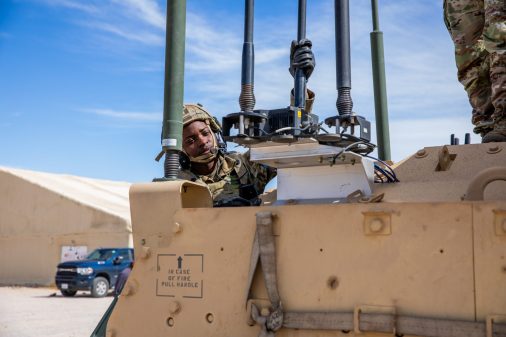Pentagon wants $450M for RDER tech experiments in fiscal 2025

The Pentagon is requesting significantly less funding in the next fiscal year for its Rapid Defense Experimentation Reserve (RDER), according to budget documents released Monday.
RDER, which was established in 2021, is a signature initiative of Undersecretary of Defense for Research and Engineering Heidi Shyu. Its purpose is to accelerate technologies through the development pipeline from prototypes to validated military capabilities, working directly with the services, combatant commanders, the Joint Staff and industry partners.
The program is focused on capabilities that would be key to joint warfighting in a highly contested environment, including counter-command, control, computing, communications, cyber, intelligence, surveillance, reconnaissance and targeting (counter-C5ISRT); contested logistics; joint fires; command and control; and information advantage, according to Shyu. Using what she calls “agile development methods,” the goal is to shave two to four years off the timeline for delivering capabilities, compared to traditional processes.
The Pentagon is requesting $450 million for RDER in fiscal 2025, significantly down from the $687 million it sought for fiscal 2024. However, it’s still more than its fiscal 2023 request, which came in at $359 million.
Budget documents released Monday did not explain the reason for the drop in funding proposed for 2025. However, a DOD spokesperson suggested it stemmed from budget pressures related to a law passed in 2023.
“The Fiscal Responsibility Act (FRA) caps are mandatory and, if disregarded or exceeded, would be enforced by sequestration. Understanding those fiscal constraints, the Department made responsible choices to prioritize readiness and take care of people but make targeted reductions to programs that will not deliver capability to the force until the 2030s, preserving and enhancing the Joint Force’s ability to fight and win in the near term,” the spokesperson said in an email to DefenseScoop.
Last year at the annual McAleese Defense Programs Conference, Shyu attributed the bumped-up funding request for 2024 to the fact that the department wanted to conduct multiple technology “sprints” that year.
The department will typically need around $300 million to $350 million per sprint, she said at that event.
“The RDER process draws on the strengths of iterative feedback loops between warfighters and technologists throughout the testing and experimentation phase,” Shyu explained in her prepared remarks for NDIA’s Pacific Operational Science and Technology Conference last week, which were provided to DefenseScoop. “While commercially available components are crucial building blocks, often these systems need to be tailored for military-specific use, demonstrating the value of mission engineering. This is exactly what we are doing through RDER and our rapid prototyping process.”
As an example of a RDER success, Shyu highlighted the demonstration of the family of integrated targeting cells (FITC) that can integrate data from multiple domains into a single, mobile system — noting that the Marines expect the experimentation to accelerate fielding of that capability by four years.
During recent technology readiness experimentation, or what the Pentagon calls T-REX, the department has validated a variety of advanced capabilities including drones — such as loitering munitions and unmanned surface vehicles — resilient communication systems and decoys, according to Shyu. They were tapped for further evaluation and testing by troops at the Northern Edge or Valiant Shield exercises.
The procurement of three RDER-related capabilities was green-lit by the Deputy’s Management Action Group — a key Pentagon resource decision-making board — late last year, according to Shyu, and officials plan to bring more RDER capabilities to the group for review later this year.
“We have stuff … go through the process continuously. Right? So the stuff, like over 30 items that we tested in Indiana [at Camp Atterburry], went to Northern Edge for experimentation. The stuff that graduates and proves its military utility will come up to the DMAGs ready to accelerate it,” Shyu told reporters on the sidelines of the Potomac Officers Club’s annual Defense R&D Summit in January.
She noted that the Pentagon is also planning to conduct a T-REX event in Australia this year and RDER experiment there next year.






